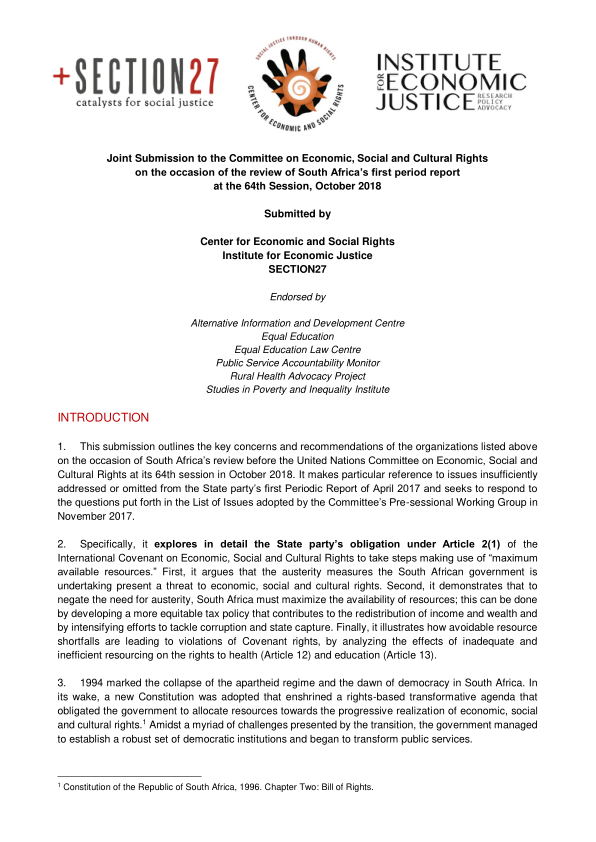This submission outlines the key concerns and recommendations of the organizations listed, on the occasion of South Africa’s review before the United Nations Committee on Economic, Social and Cultural Rights at its 64th session in October 2018. It makes particular reference to issues insufficiently addressed or omitted from the State party’s first Periodic Report of April 2017 and seeks to respond to the questions put forth in the List of Issues adopted by the Committee’s Pre-sessional Working Group in November 2017.
Specifically, it explores in detail the State party’s obligation under Article 2(1) of the International Covenant on Economic, Social and Cultural Rights to take steps making use of “maximum available resources.” First, it argues that the austerity measures the South African government is undertaking present a threat to economic, social and cultural rights. Second, it demonstrates that to negate the need for austerity, South Africa must maximize the availability of resources; this can be done by developing a more equitable tax policy that contributes to the redistribution of income and wealth and by intensifying efforts to tackle corruption and state capture. Finally, it illustrates how avoidable resource shortfalls are leading to violations of Covenant rights, by analyzing the effects of inadequate and inefficient resourcing on the rights to health (Article 12) and education (Article 13).
1994 marked the collapse of the apartheid regime and the dawn of democracy in South Africa. In its wake, a new Constitution was adopted that enshrined a rights-based transformative agenda that obligated the government to allocate resources towards the progressive realization of economic, social and cultural rights. Amidst a myriad of challenges presented by the transition, the government managed to establish a robust set of democratic institutions and began to transform public services. Access to electricity and clean water improved, as did infant mortality rates and university attendance rates.
Despite these improvements, systemic inequality continues to be ingrained in the country’s economic and social structures. Poverty and unemployment are experienced by broad swathes of society and intersect with stark disparities in access to health, education, housing and even food. Corruption thrives under such conditions of inequality, diminishing available resources and eroding trust in public administration and private enterprise alike. For these reasons, apartheid’s legacy continues to have an outsized impact on people’s economic, social and cultural rights.
These challenges are compounded by austerity policies that have been introduced in the form of cuts in expenditures and regressive tax changes in recent years. These measures do not meet the Committee’s criteria for justifying retrogressive measures, namely that they be: temporary, remaining in place only insofar as they are necessary; legitimate, with the ultimate aim of protecting the totality of human rights; reasonable, with the means chosen being the most capable of achieving the legitimate aim; necessary, with all alternative financing measures comprehensively exhausted; proportionate, in that their human rights benefits outweigh their costs; not directly nor indirectly discriminatory, according priority attention to disadvantaged groups; protective of the minimum core content of rights; based on transparency and genuine participation of affected groups and subject to meaningful review and accountability procedures.
This submission demonstrates that the State party is introducing austerity measures, for an indefinite period, due in large part to exaggerated concerns of a growing public debt crisis. Further, it shows these austerity measures are being introduced in a context of extreme inequality, deeply rooted poverty, and growing unemployment, which makes them an unreasonable method of tackling the country’s fiscal issues. To address the underlying causes of these issues, a more inclusive model of economic development is needed: one that prioritizes rights realization.
